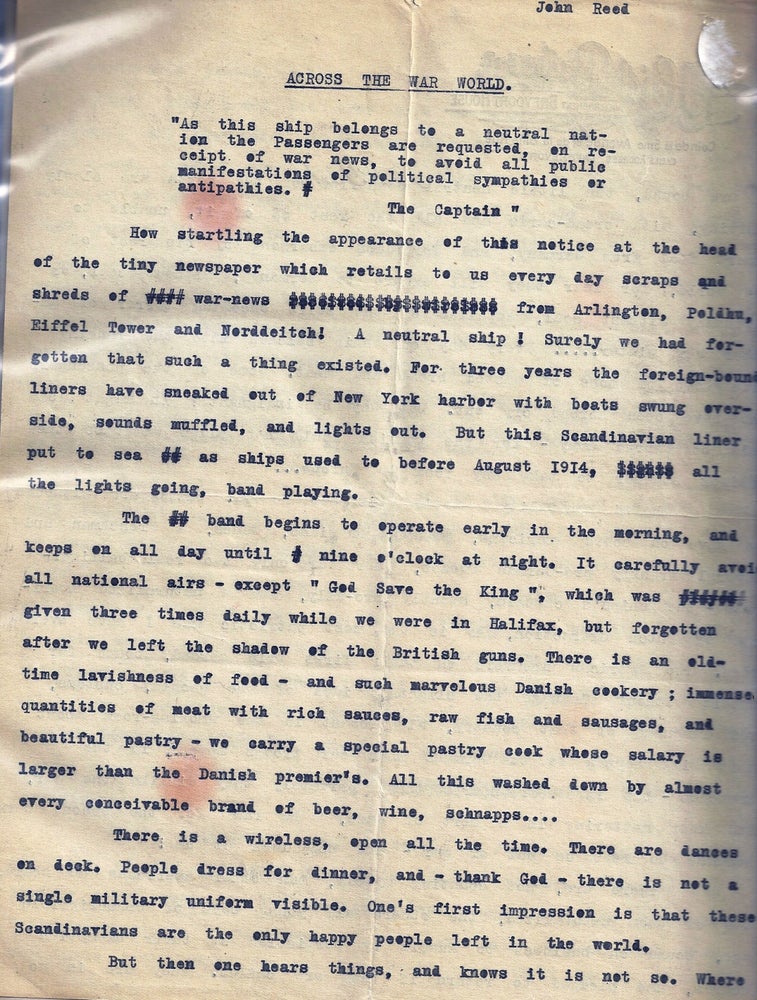
ACROSS THE WAR WORLD (UNPUBLISHED TYPESCRIPT)
At sea: Hillacre, September, 1917. First Edition. Manuscript. Nine pages typed on four 8-1/2" x 11" leaves of Hotel Brevoort letterhead and Scandinavian-American Line letterhead with Reed's name typed at the top right corner of the first page, and pages numbered at the tops of the following pages. With the original envelope addressed in Reed's hand, postmarked twice and stamped "Opened by Censor." Reed's important unpublished typescript was written while he was traveling on board a Danish liner from the United States to Norway during World War I. It was intended to be published in THE MASSES, but the delay in transit -- the first postmark is dated 3 September 1917, and received in Croton-on-Hudson on 11 August 1919, addressed to Mrs. B[oardman] Robinson -- as well as that magazine's legal battle under the Sedition Act must have precluded its publication.
Reed begins his essay with a transcription of a notice that was posted on board the ship. It reads: "As this ship belongs to a neutral nation the Passengers are requested, on receipt of war news, to avoid all public manifestations of political sympathies or antipathies./The Captain." Reed describes the appearance of this notice as "startling" and goes on to describe his fellow passengers, commenting on the fact that they share their world views with each other in spite of it. He explains, "The 'neutrality' notice is not needed. Although we have on board Americans, Russians, Danes, a Frenchman and several frankly pro-German Swedes, there are only two real belligerents-- the ship's captain, stoutly pro-Ally, and a naturalized American of Dutch extraction, who is the most patriotic man I have ever seen."
Reed continues by saying that many of the second and third class passengers are Jews who had been living in the Lower East Side:
"Most of them are political exiles, sent home at the expense of the new Provisional government. You had to prove that you were a political exile, of course, before you got the ticket and two hundred dollars allowed; and to do this it was necessary to appear before the nearest Russian Consul.... What Odysseys the least of these people had endured!"
Reed sums up the plight of the returning exiles with a question: "Wasn't Russia their country now, to do with as they pleased, and weren’t they going home to set things right?"
In concluding his essay, Reed illustrates the fact that in spite of the war news coming through on the wireless set, the "neutral" journey at sea was as unreal as the news of war: "It is lunch-time. We are eating fresh mackerel, taken on board at Christianssand. Somebody remarks that the mackerel this year are extraordinarily fat.... And looking up, I see that everyone, a little smiling, a little pale, is thinking of what those fat fish have been eating, out there in the North Sea and along the coast of Flanders...." Occasional staining, some aging to paper, normal folds from mailing. Very Good. Item #015418
John Reed was perhaps the best known left-wing American journalist of the twentieth century. He was portrayed by Warren Beatty in the film REDS, nominated for twelve Academy Awards and winner of three, which centered on Reed's life, his romance with Louise Bryant, and his early death at 33 in Moscow. His best known book, TEN DAYS THAT SHOOK THE WORLD, 1919, recorded his eyewitness account of the 1917 Bolshevik Revolution in Russia. Reed became head of the U. S. Communist Labor Party in 1919, was indicted for treason, and escaped to the Soviet Union where he worked with Lenin and others. He died of typhus in 1920 and was buried beside the Kremlin wall.
Price: $5,000.00


